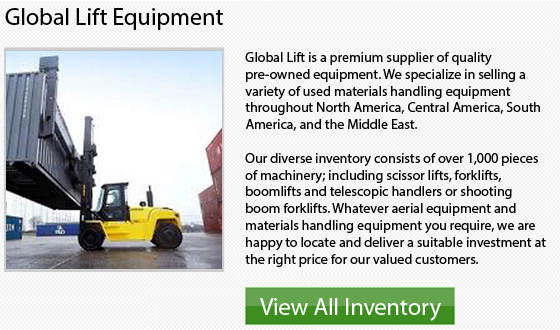
Propane cylinders take up little space and they can be kept either inside of a storage area or outside of a facility. It does take some time to switch out a propane cylinder, although, it still does need knowledge of safety standards like for example the OSHA or Occupational Health and Safety Administration and also requires operator training in order to be performed safely.
Compared to the electric truck, internal combustion forklifts are easier and faster to refuel. Nonetheless, the IC engine does create polluting emissions and are extremely noisy.
NARROW-AISLE FORKLIFTS
The Class 2 forklifts includes many varieties of lift truck that are specifically designed to be used in narrow aisles. The typical storage aisles are 12 feet wide, and this easily allows a counterbalanced forklift to turn in the aisle and put a load away. Typically, narrow aisles are 8 feet wide, whereas the very narrow aisles are roughly 5.5 to 6 feet wide. These narrow aisles require specialized forklifts that are capable of putting away cargo which are small enough to turn on a tight radius or without any turning at all.
The three most common narrow aisle lift trucks are the order pickers, reach trucks and turret trucks. The differences among these trucks are discussed below.
Narrow-Aisle Reach Forklifts
The original narrow-aisle lift truck is considered to be the conventional reach truck. These machinery do not need a huge counterweight and are hence, small enough to turn in narrow aisles. Instead, stability is provided by the outrigger arms which extend in front of the lift trucks. However, depending on the storage configuration, these outrigger arms could prevent the forklifts from getting near enough to the storage rack to retrieve and deposit cargo. To be able to overcome this situation, a pantograph was designed. The pantograph is really a reach truck that is made with a telescoping device. This enables forks to concisely and easily reach into storage areas.
The ideal environment for a narrow-aisle forklift is a place that has good lighting, is clean, and has well-maintained floors, good traffic flow, as well as a sufficient turning aisle.
These equipment have changed the material handling industry. Toyota stands behind their dedication to offering extremely durable equipment and excellent quality. As the business evolves, they always strive to apply solutions so as to offer their diverse customer base with the best products available.